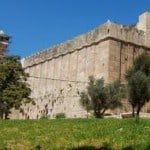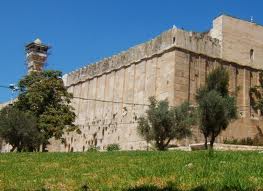 Sarah dies at the age of 127 and Avraham approaches the “sons of Heth” to purchase the Machpelah Cave in Hebron. The Torah spends what seems to be an inordinate amount of text to describe the negotiations, the agreement and the amount of money necessary for this purchase.
Sarah dies at the age of 127 and Avraham approaches the “sons of Heth” to purchase the Machpelah Cave in Hebron. The Torah spends what seems to be an inordinate amount of text to describe the negotiations, the agreement and the amount of money necessary for this purchase.
The Midrash Rabba gives an explanation for this seemingly superfluous text:
Said Rabbi Judan the son of Rabbi Simon: This is one of the three places regarding which the nations of the world cannot accuse Israel and say, “You have stolen them.” The three places are: the Cave of Machpeilah, the site of the Holy Temple, and the tomb of Joseph at Shechem.
The Cave of Machpelah in Hebron:
” And Abraham hearkened unto Ephron; and Abraham weighed to Ephron the silver, which he had named in the hearing of the children of Heth, four hundred shekels of silver, current money with the merchant. ( genesis 23:16 )
The site of the Temple in Jerusalem:
“So David gave to Ornan for the place six hundred shekels of gold by weight. (I Chronicles 21:25)
The Tomb of Joseph in Shechem:
“And he bought the parcel of ground, where he had spread his tent, at the hand of the children of Hamor, Shechem’s father, for a hundred pieces of money. (genesis 33:19)
Our sages state that the details of the purchase were described so that when ownership of these lands will be questioned in the end of days , the Tanach , the Biblical text will serve as the deed.
So it is not surprising that thousands of years later it is these three locations that consistently flare up as the hot spots in the Arab -Israeli conflict. In this part of the world metaphors and symbols develop into real and dangerous life and death situations.
Signposts and narratives become the arbiters of reality. It is around these three locations that much passion has been stirred and much theology has been reconstructed. Regrettably as well much blood has been spilled. The forces who would consciously or unconsciously wish to deflect the direction of Biblical destiny would need to begin by uprooting these signposts first. The locations that have been purchased by Biblical deed necessarily become the locations that need to be uprooted before all else.
Yet the dangers do not rest simply in the plans and designs of the nations wishing to uproot and annihilate the Jewish people. They also reside in the fears lurking in the hearts of our people.
When Moshe sent the twelve spies into the land to explore its strengths and weaknesses, ten came back with an evil report and Joshua and Calev declared that “the land is very very good”.
It is clear that Joshua had the strength to avoid the pitfall of the other spies because he received a special blessing as a result of the fact that his name was changed from Hoshea to Yehoshuah ( Rashi, Sotah 34b) .Yet Calev as well did not fall prey to the disheartened spirit that felled the other ten spies. In fact we hear G-d speaking of Calev,”But as for My servant Caleb, since he was possessed by different spirit, and he followed Me, I will bring him to the land to which he came, and his descendants will drive its inhabitants out.( Bamidbar /Numbers 14:24)
Rashi points to the verse describing the entry of the spies into the land ” They went up in, the south, and he came to Hebron…” ( ibid 13:22) and asks why it did not say “They went up in, the south, and they came to Hebron” . Rashi explains that while the other spies entered from the south and continued forward , Calev, then turned aside to pray at the caves of the Patriarchs Avraham, Yitzchak and Yaacov.
It is in Hebron that that” different spirit “ was sparked in him. As a result in the ensuing torah narrative we read , “And to him (Calev) I shall give the land upon which he trod”;(Deuteronomy 1:36) and then we read “And to Calev they gave Hebron” (as his portion in the Land of Israel) (Judges 1:20).
It is clear that Hevron is the key. It is the first key. Avraham bought this plot of land because he intuitively understood its critical nature. Hevron changes every individual who walks in its midst. There are no masks in Hevron. One cannot pretend in Hevron. When one understands the importance of this city, our Patriarchs and Matriarchs, one cannot fall into the fears and trepidations of the generations of the spies:
“But the men who went up with him said, “We are unable to go up against the people, for they are stronger than we. … The land we passed through to explore is a land that consumes its inhabitants, and all the people we saw in it are men of stature… In our eyes, we seemed like grasshoppers, and so we were in their eyes. ( Numbers 13:31-33).
We are living in times of great confusion. We are living in an era where darkness has mingled with light. In the midst of all that haze and cloudiness Hevron remains a key. Those amongst our people that do not understand the importance of Hevron will necessarily be frightened of the nations of the world clamoring against this people. They will see them as menacing giants and themselves as” little grasshoppers”. Those , on the other hand, that have understood the power of Hevron, the Temple mount and of Kever Yosef in Shchem will be filed with “a different spirit”. It is they who will be responsible to carry this people, in this land, into its destiny and purpose .
